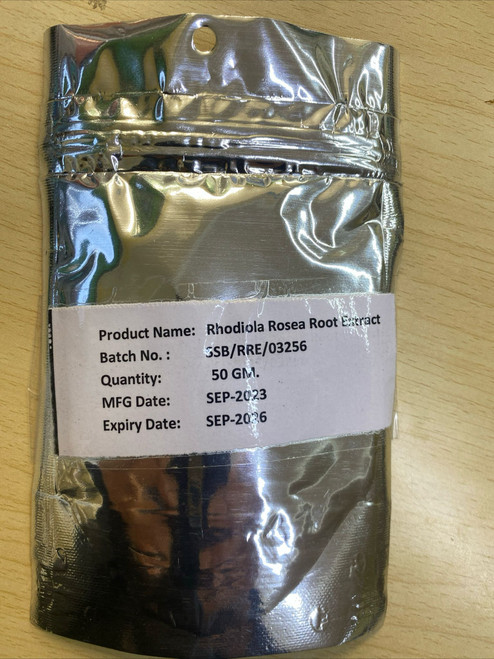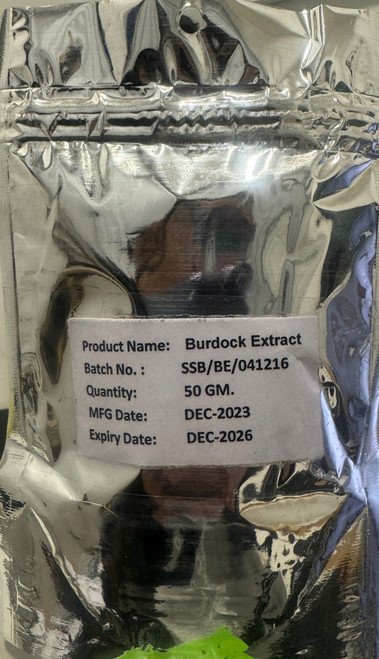Rhodiola rosea extract pure powder 50gm
Rhodiola rosea is a flowering herb that grows in cold, high-altitude regions of Europe and Asia. Other names for it include arctic root, golden root, king’s crown, and rose root.
Rhodiola rosea has been used in traditional medicine for many years, particularly in Russia, Scandinavia, and other cold, mountainous areas. Some people believeTrusted Source the herb can treat anxiety, depression, fatigue, anemia, and headaches.
Rhodiola rosea, often referred to as "golden root" or "arctic root," is a well-known adaptogenic herb that has been used for centuries in traditional medicine, particularly in Russia and Scandinavia. Here are some of the key benefits of Rhodiola rosea:
1. Stress Reduction and Adaptogen
- Rhodiola is classified as an adaptogen, meaning it helps the body adapt to and resist the effects of stress. It can reduce the physical and mental effects of stress, improving overall resilience.
2. Improved Mental Performance
- Rhodiola is known for enhancing cognitive functions, including memory, concentration, and focus. It’s particularly beneficial in reducing mental fatigue during stressful situations, such as work or study.
3. Energy and Stamina Boost
- The herb can increase physical stamina and reduce fatigue, making it popular among athletes and those with demanding physical or mental tasks. It may help improve exercise performance by reducing fatigue and supporting endurance.
4. Mood Enhancement and Antidepressant Effects
- Rhodiola has been shown to have antidepressant properties, helping to alleviate symptoms of mild to moderate depression. It works by balancing neurotransmitters such as serotonin, dopamine, and norepinephrine, which are critical for mood regulation.
5. Supports Heart Health
- By reducing stress and its impact on the body, Rhodiola can help support cardiovascular health. It may help lower blood pressure and reduce the risk of heart-related issues linked to stress.
6. Immune System Support
- Rhodiola can strengthen the immune system, making it more effective in fighting off infections. This is particularly beneficial during periods of high stress, which can weaken immunity.
7. Enhanced Physical Recovery
- Rhodiola promotes faster recovery after intense physical activity by reducing muscle damage and oxidative stress. It can also help reduce the time it takes for muscles to recover from strenuous exercise.
8. Weight Management
- Rhodiola may assist in weight management by reducing stress-related eating and supporting fat metabolism. It can help regulate cortisol levels, which are linked to fat storage, particularly around the abdomen.
9. Anti-Aging and Antioxidant Effects
- The herb is rich in antioxidants, which protect cells from oxidative damage, slowing down the aging process and reducing the risk of chronic diseases.
10. Cognitive Protection
- Rhodiola may protect against age-related cognitive decline and neurodegenerative diseases like Alzheimer’s by supporting brain function and reducing inflammation.
11. Hormonal Balance
- It can help balance hormones, particularly in women, by supporting the adrenal glands and modulating the effects of stress on hormone levels.
Usage and Caution:
Rhodiola is generally well-tolerated, but it’s important to use it as directed. It is best taken in the morning or early afternoon to avoid interfering with sleep. People with bipolar disorder, or those on certain medications, should consult a healthcare provider before using Rhodiola, as it can interact with some medications or exacerbate certain conditions.
Numerous studies have been conducted on the plant. While some results appear promising, many of the studies have been small, biased, or flawed. As such, experts say more research needs to be done to determine how Rhodiola rosea is effective, and whether it should be included in treatment plans.
Meanwhile, Rhodiola rosea has a low risk of side effects and appears to offer some benefits for many of these conditions. Therefore, it may be a natural option that is worth trying for its supposed uses.
The evidence for Rhodiola rosea’s health claims varies. The following are some of its popular uses and what research says about each one. The health benefits of this herbal root are probably linked to anti-inflammatory properties it may have.
Stress

One of the best-known claims about Rhodiola rosea is its power as a substance that helps the body adapt to stress, otherwise known as an adaptogen.
Its specific abilities and qualities, however, have not yet been scientifically proven with enough well-designed studies.
A report published in Alternative Medicine Review found that Rhodiola rosea shows promise as an adaptogen. Based on evidence from several small studies, the author states that the plant’s extracts provide benefits for mental health and heart function.
Another 2005 articleTrusted Source describes Rhodiola rosea as “a versatile adaptogen,” stating that the herb can increase resistance to stress. In particular, the authors state that it holds promise as a possible treatment for reducing stress hormone levels and stress-induced heart problems.
Physical and mental performance
Some people take Rhodiola rosea to enhance physical performance before exercise or as a way to improve concentration and thinking. There are also claims that it helps reduce physical and mental fatigue.
A number of studies touch on these claims. They include the following:
- A reviewTrusted Source that states Rhodiola rosea may hold promise as an aid for enhanced physical and mental performance. The authors conclude that more research on the plant is needed to further examine and prove its effects.
- A studyTrusted Source in 2009 found that women who took a high dose of Rhodiola rosea were able to run faster than those who got a placebo. The study examined 15 college-age women.
- Another studyTrusted Source suggests that taking a standardized extract of Rhodiola rosea may improve concentration and reduce fatigue. The research looked at 60 men and women, who took an extract called SHR-5. The dosage given for these effects was 576 milligrams (mg) per day.
Despite these results, a large 2012 review published in BMC Complementary and Alternative MedicineTrusted Source looked at 206 studies on Rhodiola rosea and fatigue but found only 11 were suitable to include.
Five of these trials determined that Rhodiola rosea helped with symptoms of physical and mental fatigue. But, the reviewers state, all of the studies had a high risk of bias or had reporting flaws with an unknown bias.
The reviewers conclude that research on Rhodiola rosea is “contradictory and inconclusive.” They recommend a non-biased, valid trial of the herb before it is put forward as a treatment for fatigue.
Depression and anxiety
One study found evidence to suggest that Rhodiola rosea may reduce symptoms of generalized anxiety disorder. Ten people were included in this study, and they took 340 mg of Rhodiola rosea extract for 10 weeks.
Another studyTrusted Source in Phytomedicine found that Rhodiola rosea reduced symptoms of depression, but its effects were mild. The herb did not reduce symptoms as effectively as sertraline, a prescription antidepressant, although it had fewer and milder side effects.
The authors of this 2015 study concluded that, as it may be better tolerated by some people and did provide benefit, Rhodiola rosea may be suitable as a treatment for mild to moderate depression. The study included 57 people who took the herb for 12 weeks.
Stress-induced eating disorders
An active ingredient in Rhodiola rosea known as salidroside, was studied for its effects on binge eating. This studyTrusted Source, published in Physiology & Behavior, was done using rats. It found that a dry extract of Rhodiola rosea that included 3.12 percent salidroside did help reduce or eliminate binge eating in the animals.
The rats that took Rhodiola rosea also had lower blood levels of a stress hormone that may play a role in binge eating.
Another study in the Journal of Psychopharmacology, similarly conducted on rats, determined that Rhodiola rosea may reduce stress-induced anorexia. The authors say their findings provide evidence to support claims that the herb has anti-stress properties.

Like many herbs, Rhodiola rosea is available in the form of capsules, tablets, dried powder, and liquid extract.
The dosage and amount of extract varies between brands and product types.
Herbs and supplements are regulated as food, not drugs, by the United States Food and Drug Administration (FDA).
As a result, knowing what dose to take and how much is included in the product is not always clear. There may also be issues with quality or purity.
Although some studies have listed dosages used for specific purposes, it appears that the herb may be taken at different strengths to treat different problems. In the Alternative Medicine Review article, the author says the dosage may vary, depending on how much standardized extract it contains.
Rosavin, in particular, is one of the compounds named as having an effect on reducing stress. The author of the review suggests approximately:
- 360-600 mg daily of an extract standardized for 1 percent rosavin
- 180-300 mg of an extract standardized for 2 percent rosavin
- 100-170 mg for an extract standardized for 3.6 percent rosavin
Rhodiola rosea, commonly known as golden root or Arctic root, is a perennial flowering plant belonging to the Crassulaceae family. Its roots have been used for centuries in traditional medicine, particularly in Russia and Scandinavian countries, for their purported adaptogenic properties. Adaptogens are substances that help the body adapt to stress and promote overall well-being.
The active compounds in Rhodiola rosea root include rosavin, rosarin, and rosin, which are collectively known as rosavins. These compounds are believed to contribute to the plant's therapeutic effects.
Extracts of Rhodiola rosea root are commonly used in dietary supplements, herbal remedies, and pharmaceutical formulations. These extracts are typically standardized to contain a specific concentration of rosavins and salidroside, another bioactive compound found in the plant.
Potential health benefits associated with Rhodiola rosea root extract include:
-
Stress reduction: Rhodiola rosea is often used to help alleviate stress and improve resilience to stressors. It may help regulate the body's stress response system, including the hypothalamic-pituitary-adrenal (HPA) axis.
-
Mental performance: Some studies suggest that Rhodiola rosea extract may enhance cognitive function, including memory, concentration, and mental clarity. It is believed to modulate neurotransmitter levels and improve cerebral blood flow.
-
Physical performance: Athletes and individuals seeking to enhance physical performance may use Rhodiola rosea extract to improve endurance, reduce fatigue, and support recovery after intense exercise. It is thought to enhance oxygen utilization and increase ATP production in cells.
-
Mood enhancement: Rhodiola rosea extract is sometimes used as a natural mood enhancer, with some evidence suggesting it may help alleviate symptoms of depression and anxiety. It may act on neurotransmitter systems involved in mood regulation.
-
Immune support: Preliminary research indicates that Rhodiola rosea extract may have immunomodulatory effects, potentially supporting the immune system's function and enhancing resistance to infections.
It's essential to note that while Rhodiola rosea root extract shows promise in various areas of health and wellness, more research is needed to fully understand its mechanisms of action and therapeutic potential. Additionally, individual responses to Rhodiola rosea extract may vary, and it's advisable to consult with a healthcare professional before starting any new supplement regimen, particularly if you have underlying health conditions or are taking medications.
Rhodiola rosea root is known by various other names, reflecting its cultural, geographical, and historical significance. Some alternative names for Rhodiola rosea root include:
- Golden root
- Arctic root
- Roseroot
- Rose root
- King's crown
- Aaron's rod
- Rhodiola
- Sedum rosea
- Arctic rose
- Orpin rose
- Rosenroot
- Rhodaxon
- Rodiola
- Rhodendron chrysanthum
- Radix Rhodiolae
- Rosavin
These names may vary depending on the region, language, and cultural context in which the plant is discussed or used.











